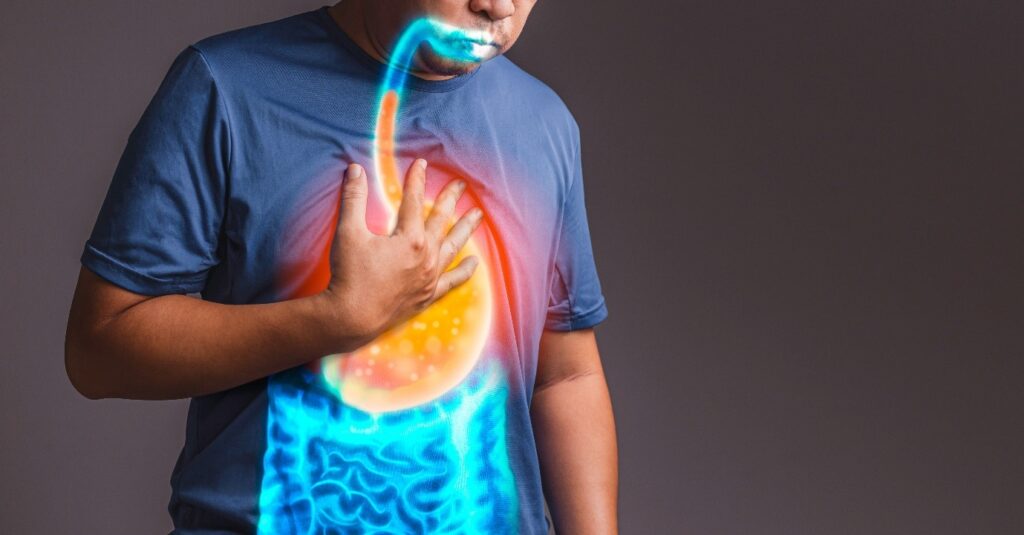What is Acid Reflux, and Why Does It Happen?
Acid reflux is a common condition where stomach acid flows backward into the esophagus, causing irritation and discomfort. Normally, your stomach contents should stay where they belong — in your stomach. However, when the valve that separates the esophagus and stomach (the lower esophageal sphincter, or LES) weakens or relaxes abnormally, acid can escape upward.
Acid reflux can cause symptoms like a burning sensation in the chest (commonly called heartburn), a sour taste in the throat, or indigestion. While occasional reflux is manageable, persistent acid reflux episodes are referred to as gastroesophageal reflux disease (GERD). GERD is a chronic condition that will damage the esophagus and result in more serious complications without proper treatment.
How is GERD Different From Stomach Ulcers?
Though GERD and stomach ulcers share overlapping symptoms, they are entirely different conditions. GERD results from acid backing up into the esophagus, whereas stomach ulcers are sores that form in the stomach lining or small intestine due to prolonged acid exposure.
GERD primarily affects the esophagus, causing heartburn, regurgitation, and even throat irritation. In contrast, stomach ulcers typically cause deep, burning pain in the abdomen, which worsens on an empty stomach. Both conditions require medical attention but differ in diagnosis and treatment.
If you’re unsure whether your symptoms point to GERD or ulcers, our expert gastroenterologists.
What are the Symptoms and Causes of Acid Reflux and GERD
Acid reflux and GERD can manifest in various ways. The most common symptoms include:
- Heartburn: A burning pain in the chest, especially after eating or lying down.
- Regurgitation: Sour or bitter-tasting acid or food backing up into your throat or mouth.
- Sore throat or hoarseness: In the morning, acid can rise into the throat while you sleep.
- Difficulty swallowing: Chronic acid exposure can cause esophageal irritation, leading to discomfort when eating or drinking.
- Nausea or bloating: Feeling queasy or overly full after meals.
- Chronic coughing or wheezing: In some cases, acid can irritate the respiratory tract, causing asthma-like symptoms.
Acid reflux and GERD can be triggered by several factors:
- Hiatal Hernia: When part of the stomach pushes through the diaphragm, it can weaken the LES, allowing acid to escape into the esophagus.
- Obesity: Excess weight increases abdominal pressure, which can push acid upward.
- Pregnancy: Hormonal changes and the growing baby can both contribute to temporary acid reflux.
- Lifestyle Factors: Smoking, alcohol consumption, and eating large or fatty meals can relax the LES, making reflux more likely.
How is GERD Diagnosed and Treated?
Our hospital offers advanced diagnostic tools to confirm GERD and assess the severity of the condition. These may include:
- Upper Endoscopy: A small camera is inserted into the esophagus to look for signs of inflammation or damage.
- Esophageal pH Monitoring: This measures the acidity levels in the esophagus over 24 hours to identify reflux patterns.
- Esophagram (Barium Swallow): An X-ray test that visualizes the esophagus and identifies any abnormalities.
Once diagnosed, GERD can be effectively managed through lifestyle modifications, medications, or surgery, depending on the severity of your condition.
Non-Surgical Treatments:
- Lifestyle Changes: Eating smaller meals, avoiding trigger foods, and maintaining a healthy weight can significantly reduce symptoms.
- Medications:
- Antacids (e.g., Tums®, Rolaids®): Neutralize stomach acid for temporary relief.
- H2 Blockers: Reduce acid production and are effective for mild to moderate symptoms.
- Proton Pump Inhibitors (PPIs): Stronger acid blockers that also promote healing of esophageal damage.
Surgical Treatments:
For severe GERD cases that don’t respond to medications, our surgeons may recommend:
- Nissen Fundoplication: The upper portion of the stomach is wrapped around the esophagus to strengthen the LES and prevent acid reflux.
- LINX Device: A small ring of magnetic beads is implanted around the esophagus to keep the LES closed while still allowing food to pass through.
Both procedures are minimally invasive and highly effective in reducing or eliminating GERD symptoms.
Complications of Untreated GERD
GERD isn’t just uncomfortable — it can cause long-term damage if left untreated. Possible complications include:
- Esophagitis: Chronic inflammation of the esophagus, which can cause pain, ulcers, and bleeding.
- Barrett’s Esophagus: A condition where the esophageal lining changes due to repeated acid exposure, increasing the risk of esophageal cancer.
- Esophageal Strictures: Scar tissue can form, narrowing the esophagus and making swallowing difficult.
- Respiratory Issues: Acid can enter the lungs, causing chronic cough, asthma-like symptoms, or even pneumonia.
Managing Acid Reflux at Home and When to Seek Help
If you’re experiencing mild symptoms, simple home remedies and lifestyle changes can help:
- Eat Smaller Meals: Large meals put pressure on your LES. Opt for smaller portions throughout the day.
- Avoid Trigger Foods: Spicy, fatty, or acidic foods, as well as alcohol and caffeine, can worsen symptoms.
- Sleep Smart: Elevate your head while sleeping and avoid lying down immediately after meals. Sleeping on your left side can also help prevent acid from rising.
- Quit Smoking and Limit Alcohol: Both weaken the LES and increase acid production.
However, if symptoms continue or worsen despite these efforts, it’s time to seek medical attention. Frequent or severe acid reflux can signal GERD, which requires professional evaluation and treatment.
Take control of your life and say goodbye to acid reflux! At Kamala Maternity and General Hospital, we provide expert care and advanced treatments to bring you lasting relief. Schedule your consultation today and start your journey to a healthier, heartburn-free future!



